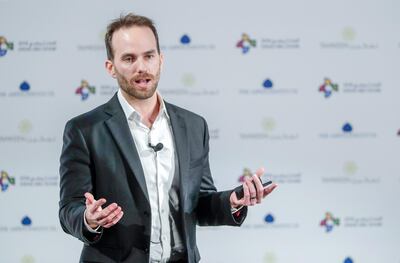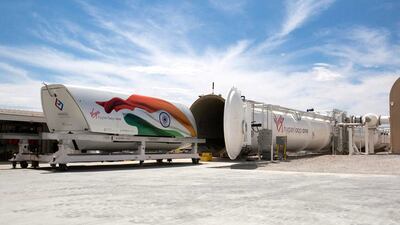Virgin Hyperloop One is aiming for a 2022 test launch for its first working transport system, as its co-founder warned against rushing previously untested technology into the market.
Josh Giegel, co-founder and chief technology officer, predicted the first commercial line is unlikely to be running until the second half of the 2020s.
Virgin is working towards a project in Dubai for port operator DP World and on a system connecting the Indian economic hubs of Mumbai and Pune, among others.
A series of rival international companies are vying to create the first commercial system and there have been competing claims about when and where it will be ready.
Hyperloop Transportation Technologies, a rival to Virgin Hyperloop One, is also working on major projects in the UAE.
Mr Giegel, a propulsion engineer by training, said claims in the industry that the technology could be ready by next year were highly unlikely.
"Anybody claiming they're going to put a passenger-carrying hyperloop in the next year or two when they haven't even built a prototype, I think is outlandish," said Mr Giegel, speaking to The National at the Ideas Abu Dhabi festival.
“We’re following a very measured approach that is really working hand in hand with the regulators. We think 2022 is a realistic time to create not just a working system but a safe system.”
Advocates of the hyperloop, which would see train-like vehicles travel through tunnels at roughly the same speed as aeroplanes, say the technology will revolutionise transport and societies.
A journey between Abu Dhabi and Dubai could take as little as 12 minutes, while there are ambitious proposals to create a regional network connecting the whole of the Middle East.
Virgin Hyperloop One currently has a 500-metre test track, built in 2017, and a prototype in Arizona.
The company is now focused on improving efficiency and reliability until it is ready to reliably carry passengers, a process Mr Giegel said was equivalent to turning “a World War One plane to an A320”.
The firm is aiming to have its system tested by US and EU regulators on a 10km track by 2022, approved by 2023, and will then be able to start constructing a commercial track.

Virgin hope to connect Mumbai and Pune, cutting the 120km journey time from five hours by car to 25 minutes. However, that track is not expected to be operating commercially until 2028, while shorter commercial routes, potentially in the UAE, could be running by 2026, Mr Giegel told the Ideas Abu Dhabi conference on Thursday.
Expanding on timeframes, he said he was “very concerned” where rushing to create a hyperloop would end.
“A failure of someone in the industry would have bad repercussions for the whole industry itself,” he said.
“I think anybody, regardless of whether its hyperloop, a flying car, an autonomous vehicle or a flying drone, people need to take safety very seriously because a bad actor could set the industry back or potentially completely collapse the industry.”
“If we’re first, which we intend to be, that’s great but if someone else can achieve the same level of safety that’s what you and I as a paying customer can expect.”
Across the Middle East region, Mr Giegel has long-term plans for 4,000km of Hyperloop. He said that as well as the UAE and Saudi governments, which have embraced the futuristic transport system, talks have taken place with administrations in Kuwait, Oman and Bahrain. The system could eventually connect the Gulf region with Turkey, Iraq and Africa, he said.
Mr Giegel said it would have the potential to transform societies, as well as saving commuters time. He said travelling on it would feel similar to being on an aircraft taking off.
“I think the ability to turn up and go somewhere where you want to, when you want to, is pretty transformative,” he said.
“If there’s someone who’s 1,000km away, and you can see them in an hour, see them every day, they become your neighbour.”

